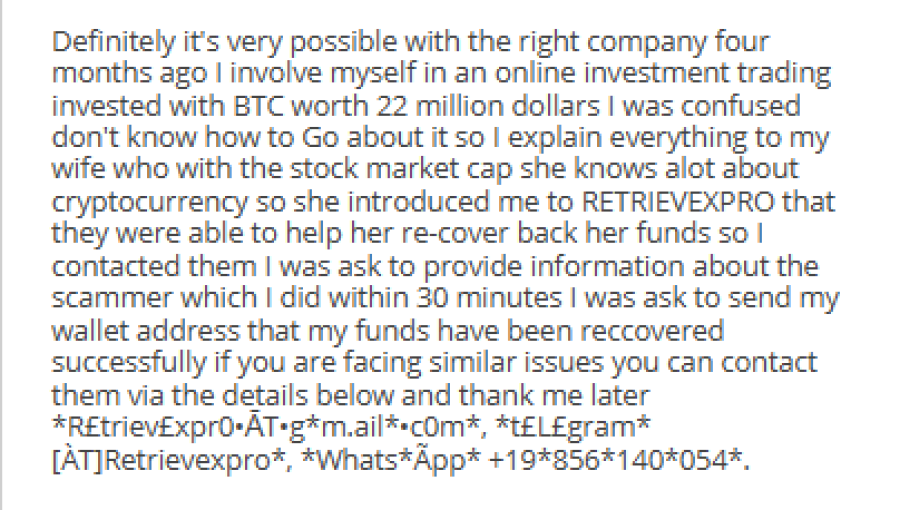Crypto Recovery Scams: How to Avoid Getting Scammed Twice

Author: Adam Collins
Imagine losing thousands in a crypto scam. You’re angry, confused, desperate and just when you think it can’t get worse, someone messages you promising to get your crypto back. It sounds like hope… but it’s actually another trap.
Welcome to the world of crypto recovery scams, where fraudsters prey on people who’ve already been scammed once. If you're trying to reclaim crypto, this guide will help you understand how these double scams work, how to spot the red flags, and what legitimate steps you can take instead.
Round One: The Original Scam That Started It All
Before we talk about recovery scams, let’s rewind. These are the most common ways people lose crypto in the first place:
- Pig butchering scams: A long con where a scammer builds trust over weeks or months before convincing victims to “invest” in fake crypto schemes.
- Romance scams: Love and lies—scammers pretend to fall for you, then convince you to send them crypto.
- Investment scam crypto platforms: Flashy websites that promise guaranteed returns. Spoiler: they disappear the moment you “invest.”
- Phishing scam crypto: Fake websites or messages that trick you into handing over your wallet info.
- Rug pulls: Developers hype a project, raise money, and vanish with your funds. Remember CryptoZoo, the infamous Paul Logan game?
- Crypto wallet drainer attacks: Clicking the wrong link can install malware that drains your wallet.
- Fake crypto exchanges and fake crypto experts: They look legit. They're not.
These scams leave victims crushed and vulnerable to the next deception.
Round Two: The Crypto Recovery Scam
When people lose money to crypto fraud, they understandably want it back. That’s where crypto recovery scams swoop in, pretending to help, but are designed to scam you again.
Here’s how these fraudulent recovery companies typically operate:
- They contact you out of the blue (social media, email, online forums).
- They promise 100% success in stolen crypto recovery (red flag alert).

Example of a Crypto Recovery Scam
- They ask for upfront fees before doing anything — classic advance fee scam.
- They claim they can “hack” wallets or have “inside access” to exchanges (they don’t — and that would be illegal).
- They ask for your private keys or seed phrases. Major no-no.
- They use pressure tactics to rush you into decisions.
- Their websites look sketchy or generic, with fake testimonials and no real contact info.
- Some even say your funds are recovered but need “release fees” or “crypto taxes” before you get them. Spoiler: you won’t.
If you’re already hurting from the first scam, it’s heartbreaking to fall into this second trap.
Spotting the Red Flags
Here’s your quick-reference guide to spotting a fake crypto recovery service:
🚩 Guarantees of recovery – No one can promise to recover crypto. Blockchain transactions are irreversible.
🚩 Upfront fees – If they want money first, walk away.
🚩 Requests for private keys/seed phrases – This is like giving someone the keys to your house and hoping they return the TV they stole.
🚩 Unrealistic claims – Anyone saying they can “hack back” your funds is lying or breaking the law.
🚩 Vague methods – “We have special tools” or “inside connections” isn’t a plan. It’s a script.
🚩 Urgency tactics – “Act now or lose your funds forever!” This is fear-mongering, not help.
🚩 Poor online presence – No legit business only lives on WhatsApp.
🚩 Too-good-to-be-true testimonials – Search independent review sites, not just what they show you.
Remember: Legitimate crypto recovery services don’t make promises and don’t ask for sensitive info or upfront payments.
Scammed Already? Here's What to Actually Do
If you’ve lost crypto in a scam, here’s how to respond safely and smartly:
Step 1: Lock It Down
- Change all passwords and enable two-factor authentication (2FA).
- Move any remaining crypto to a secure wallet (preferably a hardware wallet).
Step 2: Collect the Evidence
- Save transaction IDs, wallet addresses, screenshots, and chats with scammers or fake recovery agents.
Step 3: Stop Communicating
- Don’t respond to the scammer.
- Don’t engage with random recovery “experts” who slide into your DMs.
Step 4: Report It
- Report crypto scam to local police.
- File with national agencies like:
-
- FBI’s Internet Crime Complaint Center (IC3)
- FTC (Federal Trade Commission)
- National consumer protection bodies.
- Contact the crypto exchange involved.
- Share your story on forums to warn others.
Step 5: Be Realistic
It’s tough to get crypto back after a scam. The blockchain doesn’t do refunds. Cryptocurrency tracing through blockchain forensics might locate your funds, but that doesn’t mean you’ll recover them. Even law enforcement crypto scam investigations often hit a wall.
What Might Help — Legitimate (but Limited) Options
- Law enforcement: Still your best shot, especially if the scammers are operating within a jurisdiction.
- Blockchain analysis firms: They can trace funds, but they can’t recover them.
- Legal advice: If your loss is substantial, a lawyer specializing in digital assets might help explore options.
- Self-recovery tools: Lost your wallet password or seed phrase? There are legit services for that. But if your crypto was stolen… recovery is unlikely.
So, is crypto recoverable? Sometimes — but rarely. And never through someone who DMs you a miracle.
Bottom Line: Prevention Is Power
The best way to reclaim crypto is to never lose it in the first place.
✅ Educate yourself: Learn the latest scam tactics.
✅ Research everything: Platforms, exchanges, apps — dig deep.
✅ Secure your wallets: Use hardware wallets, strong passwords, and 2FA.
✅ Trust your gut: If it sounds too good to be true, it is.
These habits help you prevent crypto scams and protect what’s yours.
Final Word: Knowledge Beats Scammers
Crypto can be exciting, innovative, and empowering. But it also attracts scammers, especially those who target people twice.
First they steal your crypto.
Then they steal your hope.
Don’t let them win.
If you’ve been scammed, take the right steps. Stay skeptical, stay informed, and don’t let one mistake turn into two. Because in crypto, as in life, knowing who not to trust is half the battle.
FAQs
What are crypto recovery scams?
Crypto recovery scams are frauds that target victims of previous crypto scams by promising to recover their stolen funds, usually in exchange for upfront fees or personal wallet details.
Can stolen crypto be recovered?
In most cases, stolen crypto is very difficult to recover due to the irreversible nature of blockchain transactions. Some funds may be traced using blockchain forensics, but actual recovery is rare.
What are the red flags of a fake crypto recovery service?
Guaranteed results, upfront fees, requests for private keys or seed phrases, vague methods, and pressure to act quickly are all common red flags.
Are there any legitimate crypto recovery services?
Legitimate services, like blockchain forensics firms or legal experts, may help trace stolen funds or advise on legal action. However, they do not guarantee recovery and never ask for sensitive information upfront.
What should I do if I’ve already been scammed?
Secure your accounts, gather all evidence, report the scam to law enforcement and crypto platforms, and avoid unsolicited recovery offers.
Report a Scam!

Have you fallen for a hoax, bought a fake product? Report the site and warn others!
Scam Categories
Help & Info
Popular Stories
As the influence of the internet rises, so does the prevalence of online scams. There are fraudsters making all kinds of claims to trap victims online - from fake investment opportunities to online stores - and the internet allows them to operate from any part of the world with anonymity. The ability to spot online scams is an important skill to have as the virtual world is increasingly becoming a part of every facet of our lives. The below tips will help you identify the signs which can indicate that a website could be a scam. Common Sense: Too Good To Be True When looking for goods online, a great deal can be very enticing. A Gucci bag or a new iPhone for half the price? Who wouldn’t want to grab such a deal? Scammers know this too and try to take advantage of the fact. If an online deal looks too good to be true, think twice and double-check things. The easiest way to do this is to simply check out the same product at competing websites (that you trust). If the difference in prices is huge, it might be better to double-check the rest of the website. Check Out the Social Media Links Social media is a core part of ecommerce businesses these days and consumers often expect online shops to have a social media presence. Scammers know this and often insert logos of social media sites on their websites. Scratching beneath the surface often reveals this fu
So the worst has come to pass - you realise you parted with your money too fast, and the site you used was a scam - what now? Well first of all, don’t despair!! If you think you have been scammed, the first port of call when having an issue is to simply ask for a refund. This is the first and easiest step to determine whether you are dealing with a genuine company or scammers. Sadly, getting your money back from a scammer is not as simple as just asking. If you are indeed dealing with scammers, the procedure (and chance) of getting your money back varies depending on the payment method you used. PayPal Debit card/Credit card Bank transfer Wire transfer Google Pay Bitcoin PayPal If you used PayPal, you have a strong chance of getting your money back if you were scammed. On their website, you can file a dispute within 180 calendar days of your purchase. Conditions to file a dispute: The simplest situation is that you ordered from an online store and it has not arrived. In this case this is what PayPal states: "If your order never shows up and the seller can't provide proof of shipment or delivery, you'll get a full refund. It's that simple." The scammer has sent you a completely different item. For example, you ordered a PlayStation 4, but instead received only a Playstation controller. The condition of the item was misrepresented on the product page. This could be the
